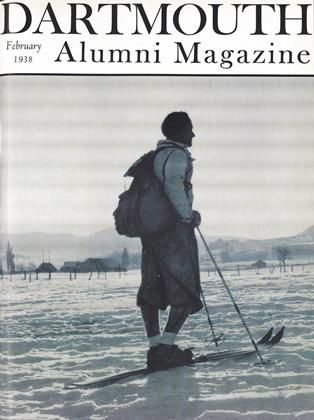by Earl Cranston '16. Abingdon Press, 1937. p. 256. $2.00.
Dartmouth men whose interests are religious or international will be glad to read this earnest study of the war problem, written by one of the ablest members of Dartmouth's own "war generation."
The most unusual feature of the book is its detailed condemnation of each of the past wars of the United States. Many of us are accustomed to apologize for the Spanish War, the Mexican War and the War of 1812. But Professor Cranston's indictment is equally severe against the Revolutionary War, the Civil War and the great "doughboy" adventure of 1917. If the long list of America's wars with the Indian nations had been included, the record might be made to seem even more bloody and unpardonable.
One test of the genuineness of the peace sentiments of any citizen is his willingness to abandon the condemnation of war in general and proceed to a criticism of the particular wars which have been waged by his own country. In Professor Cranston's phrase, "it is high time that this country should realize that whenever it has played with war it has played with fire, and fire leaves scars."
The other major emphasis in "Swords or Plowshares?" is upon the necessity of international cooperation. The various cooperative efforts of the United States are carefully described and praised without reserve. The author almost implies that any program which includes several nations is a program for peace, while any effort by a single nation points toward war.
There is a growing tendency nowadays to avoid such a sweeping contrast be- tween good "internationalism" and bad "isolation." It is possible to contend that Woodrow Wilson's entrance into the World War (which Professor Cranston condemns) was the direct result of the very attitude of international responsibility which Professor Cranston advocates. To propose a complete policy of Anglo-Amer ican cooperation on the ground that Great Britain is "striving vigorously for the supremacy of the world conscience," is to ignore the Hoare-Laval Agreement and many other evidences of trafficing on the part of the British Foreign Office.
The prevention of war is, after all, as diversified a problem as is the prevention of disease. There is no panacea. To offer internationalism as the cure for all kinds of bloodshed is as misleading as to prescribe quinine for every sort of physical pain. What we need is the description of specific symptoms and the discovery of equally specific remedies.
The general public is, however, still in need of volumes which establish the basic perversion and viciousness of modern war. As a contribution to this introductory task, "Swords or Plowshares?" is worthy of high praise. Once the fundamental hostility to war has been established, the technical problems of actual prevention should prove relatively easy.
The book closes with a fascinating personal account of the intellectual atmosphere in Dartmouth in 1916. Despite the cloud of a great European war the college campus was complacent and unaware of the perplexities of international conflict. Undergraduates were given little or no preparation for the individual ordeals which they were so soon to face.
No such indifference now prevails in Hanover. Inside and outside the classrooms the students and faculty are engaged in daily wrestling with this greatest of dilemmas. The contrast with twenty years ago is great, and should be heartening to every member of the Dartmouth fellowship.
 View Full Issue
View Full Issue
More From This Issue
-
 Article
ArticleThe D. O. C. Started Something
February 1938 By CHARLES E. WIDMAYER '30 -
 Article
ArticleGradus Ad Parnassum
February 1938 By The Editor -
 Class Notes
Class NotesClass of 1914
February 1938 By Edward Leech -
 Class Notes
Class NotesClass of 1937
February 1938 By Donald C. Mckiniay -
 Class Notes
Class NotesClass of 1910
February 1938 By Hap Hinman -
 Class Notes
Class NotesClass of 1930
February 1938 By Albert Dickerson
Lewis D. Stilwell
Books
-
 Books
BooksLEGAL PSYCHOLOGY
FEBRUARY 1932 -
 Books
BooksThe Moosilauke Ravine Lodge?
June 1962 -
 Books
BooksTHE MAIN STREAM OF FRENCH LITERATURE.
December 1932 By Charles R. Bagley -
 Books
BooksWHITE HUNTER, BLACK HEART.
April 1954 By CLIFFORD L. JORDAN '45 -
 Books
BooksTREASURE MOUNTAIN,
December 1937 By Eric P., Herbert F. West '22. -
 Books
BooksLearning Curve
JANUARY | FEBRUARY 2020 By TERU CLAVEL '95





